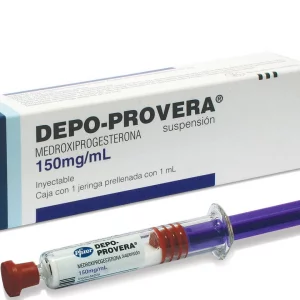Injectable hormonal contraceptives
Injectable hormonal contraceptives are purely progestin drugs with a mechanism of action similar to pills for nursing mothers, implants, etc.
The active substance (medroxyprogesterone) enters the bloodstream continuously for three months from the moment of injection, then a second injection is required. The injection site is the gluteal or deltoid muscle (“in the ass” or “in the shoulder”).
Mechanism of action of injectable hormonal contraceptives
Mechanism of action:
- suppression of ovulation,
- increased viscosity of cervical mucus (which makes it difficult for sperm to pass into the uterine cavity and further),
- impaired endometrial growth (inability to implant a fertilized egg).
The primary mechanism of action is the suppression of ovulation by inhibiting the production of pituitary hormones, which should stimulate the follicle’s growth.
Who is suitable for injectable hormonal contraceptives
Injections and other progestin contraceptives are ideal for women whose exposure to estrogens is undesirable (particularly during lactation). The main advantage of injections over tablets (both combined and purely progestin) is the duration of exposure to the drug and the absence of the need for daily monitoring.
Advantages:
- A highly effective method of contraception;
- The effect is reversible (most women may become pregnant in the first month after cancellation);
- It does not require monitoring by the patient;
- Does not require attention during sexual contact;
- It can be used in women of all ages (both those who gave birth and not);
- It can be used in nursing women. This type of contraception does not affect the quality and quantity of breast milk and the child’s development during breastfeeding.
Disadvantages:
- Injections do not protect against STIs! When choosing this method of contraception, it is necessary to use a condom when contacting a new/unstable /unexplored partner;
- Quite often, there is irregular (frequent, in some patients permanent) spotting;
- Some patients have amenorrhea (complete absence of menstruation), which is not harmful to health but psychologically uncomfortable for many patients.
Possible side effects:
- increased acne,
- increased hair loss,
- disorders of the coagulation system,
- reaction at the injection site (pain, redness), etc.
Possible complications when using injectable hormonal contraceptives:
Complications are common to all injections:
- redness,
- soreness,
- compaction at the injection site,
- rarely – the formation of an abscess.
Contraindications:
Strict contraindications:
- Pregnancy
It is also not recommended when:
- thrombosis (arterial and venous) and thromboembolism currently or in the anamnesis;
- presence of antibodies to phospholipids;
- migraines with focal neurological symptoms;
- established or suspected malignant hormone-dependent tumors;
- benign or malignant liver tumors currently or in the anamnesis;
- severe forms of liver diseases;
- congenital hyperbilirubinemia;
- uncontrolled arterial hypertension;
- bleeding from the vagina of unclear etiology.
Drugs with which a combination of injections is undesirable:
- Ritonavir-enhanced protease inhibitors (HIV treatment);
- Anticonvulsants (phenytoin, carbamazepine, barbiturates, primidone, topiramate, oxcarbazepine);
- Rifampicin, rifabutin (antibiotics; used mainly in treating tuberculosis).
Examinations before starting injections
There are no mandatory examinations! For example, suppose a woman is not pregnant, and all regular examinations (examination on a chair, PAP test, ultrasound of the mammary glands/mammography) have been passed. In that case, there is no point in additional studies. Before the injection, the only useful information is the woman’s weight and body mass index. This information will help control the onset of side effects.
The beginning of the use of injectable hormonal contraceptives:
The first injection can be made on any cycle day if pregnancy is excluded. After giving birth to nursing mothers, the first injection can be made immediately after delivery (injection is considered safe one month after delivery, but an earlier injection is also possible). The first injection can be made immediately after the abortion.
When switching from one method of contraception to another, the first injection can be performed immediately after the end of the use of previous contraceptives (there is no need to take a break for a month).
Additional contraceptives are not needed when injected within seven days from the beginning of the menstrual cycle. At the first injection, later than seven days from the onset of menstruation, it is necessary to use additional methods of contraception within seven days from the moment of administration. If the injection is performed after childbirth, then it is also required to use other contraceptives within seven days from the moment of administration (if the injection is performed in the first six months with no menstrual cycle and exclusively breastfeeding; and also if less than 21 days have passed after childbirth, regardless of the presence of breastfeeding, additional methods are not needed). At the first injection immediately after the abortion, additional contraception is not required; if more than seven days have passed since the termination of pregnancy, it is necessary to use other methods of contraception for seven days.
Monitoring and management of patients after injectable contraceptive administration
Additional visits to the gynecologist (in addition to routine annual examinations) are not required for women using injectable contraceptives.
If there are any side effects the doctor has not warned about, it is necessary to consult a gynecologist.
Repeated injections
Repeated injections should be done every three months.
If there is a need for an earlier injection (for example, a woman leaves for a long time, and the time of a new infusion falls at the time of departure), it can be performed at any time before the expiration of the 3-month interval.
If there was a delay with the re-injection, it is important how many days later the re-injection was made:
If the delay is less than two weeks, no additional methods of contraception are required;
Suppose the delay is more than two weeks. In that case, it is necessary to make sure that there is no pregnancy before and after the injection and use additional methods of contraception for seven days.

Depo Provera
Depo Provera online in the US, Europe, Worldwide
34$
Add to cart
Nexplanon
Nexplanon online in the US, Europe, Worldwide
34$
Add to cart
 Français
Français